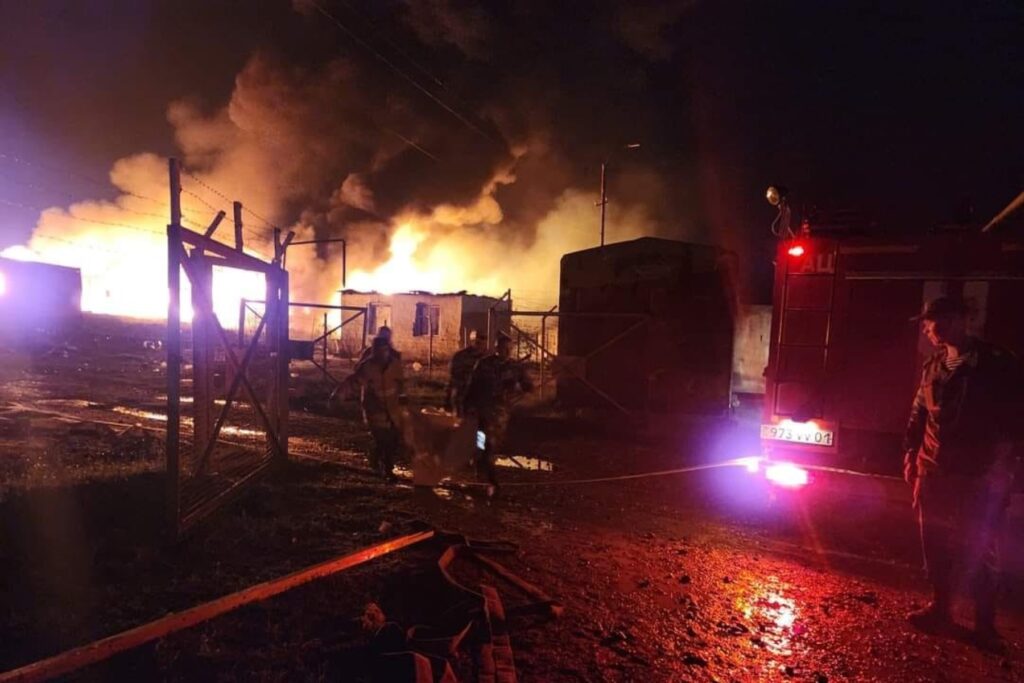At least 290 people were injured and 20 killed in a fuel depot explosion in Askeran (Asgaran) in Nagorno-Karabakh on Monday evening, as hundreds of people queued for petrol by the depot.
Since Sunday evening, Nagorno-Karabakh Armenians have been leaving the region for Armenia, with reports of intense traffic congestion on the road from Nagorno-Karabakh’s capital of Stepanakert to Goris, Armenia.
Early reports about the incident indicated that a very large number of people had been injured, with the authorities in Nagorno-Karabakh only announcing the preliminary number of victims the following day.
The region’s Health Ministry announced that up to 290 people were receiving treatment for various degrees of burns, while dozens were in critical condition.
Seven people died as a result of their injuries in medical centres, while 13 bodies were transferred to the Bureau of Forensic Examination from the site of the explosion for identification. The Ministry of Health reported that ‘many people’ remain unaccounted for.
Artak Beglaryan, Nagorno-Karabakh’s former state minister, cited eyewitnesses as saying that over 100 people were caught in the flames after the explosion.
On Tuesday morning, Armenia sent a helicopter carrying Armenian medical professionals and medical supplies to Stepanakert, also evacuating a number of injured Nagorno-Karabakh Armenians from the region to Yerevan by helicopter.
On Tuesday evening, Armenia’s Health Ministry announced that 23 Nagorno-Karabakh Armenians injured in the explosion were receiving treatment in the National Centre of Burns and Dermatology. Earlier in the afternoon, the centre stated that at least four people had been admitted to intensive care.
The region’s Russian peacekeeping contingent has also stated that they were evacuating injured people from Nagorno-Karabakh to Armenia by helicopter, while Armenian media has reported that the Red Cross has accompanied more than 10 ambulances from Stepanakert to Armenia.
Siranush Sargsyan, a journalist from Nagorno-Karabakh, described the situation at the Stepanakert Hospital as ‘absolutely catastrophic’, citing shortages of medical staff and supplies. During Azerbaijan’s ten-month blockade of Nagorno-Karabakh, increasingly severe shortages of medicines were reported due to imports of aid being blocked.
Sargsyan also wrote that several patients had been transported to a field hospital managed by the Russian peacekeeping contingent in Nagorno-Karabakh, while others were transferred to the children’s hospital in the capital.
🆘The hospital in Stepanakert #NagornoKarabakh is begging for immediate medical evacuation for the hundreds of victims of today’s explosion. No medical supplies, not enough doctors, no basic antibiotics for burn victims, due to Azerbaijan’s blockade.
Help! pic.twitter.com/6VWrAM4Os8— Siranush Sargsyan (@SiranushSargsy1) September 25, 2023
The explosion took place as thousands of Nagorno-Karabakh Armenian refugees fleeing to Armenia by car queued on the Lachin Corridor.
Marut Vanyan, a journalist previously based in Stepanakert, reported that it had taken him 20 hours to reach Goris in Armenia due to congestion on the Lachin road. Under normal traffic conditions, the 90 kilometre journey takes around two hours.
Earlier on Monday, the authorities in Stepanakert stated that they were unable to facilitate the transport of those injured in last week’s war due to congestion on the Stepanakert–Goris highway. They added that the congestion was also impeding the transfer of medical supplies to the region.
Armenia reported that at least 19,000 Nagorno-Karabakh refugees had entered the country as of Tuesday evening.
Azerbaijan sends aid
On Tuesday, Hikmat Hajiyev, assistant to the president of Azerbaijan, stated that Azerbaijan had prepared hospitals in Aghdam, Sabirabad, and Saatli to treat the victims of the explosion, and that medical supplies had been sent to the region.
We are in regular contact with @ICRC and also directly with representatives of armenian residences of Karabakh to be responsive to humanitarian needs on the ground.
- Since yesterday hospitals in Agdam, Sabirabad and Saatly regions of Azerbaijan vocated to receive substantial…— Hikmet Hajiyev (@HikmetHajiyev) September 26, 2023
In a post on X (formerly Twitter), Hajiyev said that Azerbaijan had facilitated the access of an Armenian helicopter to transfer patients from Nagorno-Karabakh to Armenia.
He added that Baku was working on providing the Red Cross with ‘exceptional access’ along a number of roads to the region to evacuate the injured and to deliver aid.
For ease of reading, we choose not to use qualifiers such as ‘de facto’, ‘unrecognised’, or ‘partially recognised’ when discussing institutions or political positions within Abkhazia, Nagorno-Karabakh, and South Ossetia. This does not imply a position on their status.




 26 September 2023
26 September 2023



